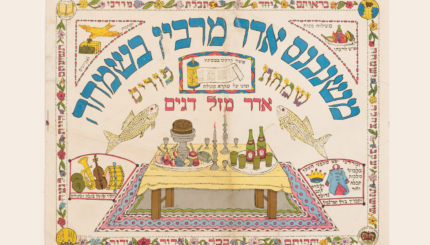The Fast of Esther is considered a minor fast day. This is reflected in the way it is observed–during daylight hours–as well as the permission to work and bathe. Other minor fast days include the 17th of Tammuz, which begins the three-week period of mourning for the destruction of the Temple that concludes with the ninth of Av, and the fast of Gedaliah, observed the day after Rosh Hashanah.
The day immediately preceding , the 13th of , is a fast day. If Purim falls on a Sunday, the fast day is observed on the preceding Thursday. Unlike the fast of Yom Kippur, the Day of Atonement, which is observed from sunset to sunset, the fast of Esther begins with daybreak and lasts till sunset, during which time food and drink of any kind are forbidden, but not such physical conveniences as bathing.
The fast is called the Fast of Esther [in Hebrew, Ta’anit Esther] and is connected with the fast in the Book of Esther. When Mordecai informed Esther of Haman’s plans, she asked him to proclaim a three-day fast (Esther 4:16).
It has been suggested that the institution of the Fast of Esther is of comparatively late origin, as it is not mentioned in halakhic [Jewish legal] literature until the eighth century. According to rabbinic tradition, the fasting of Esther occurred during the month of Nisan, soon after Haman’s casting of lots. It has further been noted that the Fast of Esther was instituted as a counterbalance to the merrymaking of Purim.

Help us keep Jewish knowledge accessible to millions of people around the world.
Your donation to My Jewish Learning fuels endless journeys of Jewish discovery. With your help, My Jewish Learning can continue to provide nonstop opportunities for learning, connection and growth.
Noting that the fast proclaimed by Esther was not on the 13th of Adar, some authorities offer a different explanation. When the children of Israel gathered together on the 13th of Adar to defend themselves against their enemies, they were in a state of war, and preparations for war always included a public fast.
One modern commentator suggests that the Jews fasted on the 13th of Adar because they were so occupied with defending themselves that they had no opportunity to eat.
Excerpted with permission from Every Person’s Guide to Purim (Jason Aronson, Inc).



